The Google Nexus 9 Review
by Joshua Ho & Ryan Smith on February 4, 2015 8:00 AM EST- Posted in
- Tablets
- HTC
- Project Denver
- Android
- Mobile
- NVIDIA
- Nexus 9
- Lollipop
- Android 5.0
CPU Performance
While Denver’s architecture is something fascinating to study, it’s important to see how well this translates to the real world. Denver on paper is a beast, but in the real world there are a number of factors to consider, not the least of which is the effectiveness of NVIDIA’s DCO. We’ve laid out that Denver’s best and worst case scenarios heavily ride on the DCO, and for NVIDIA to achieve their best-case performance they need to be able to generate and feed Denver with lots and lots of well optimized code. If Denver spends too much time working directly off of ARM code or can’t do a good job optimizing the recurring code it finds then Denver will struggle. Meanwhile other important factors are in play as well, including the benefits and drawbacks of Denver’s two cores versus competing SoC’s quad A15/A57 configurations, and in thermally constrained scenarios Denver’s ability to deliver good performance while keeping its power consumption in check.
In order to test this and general system performance, we turn our suite of benchmarks that include browser performance tests, general system tests, and game-type benchmarks. As Denver relies on code-morphing to enable out of order execution and speculative execution, most of these benchmarks should be able to show ideal performance as loop performance in Denver is basically second to none. While most of these benchmarks are showing their age, they should be usable for valid comparisons until we move to our new test suite.
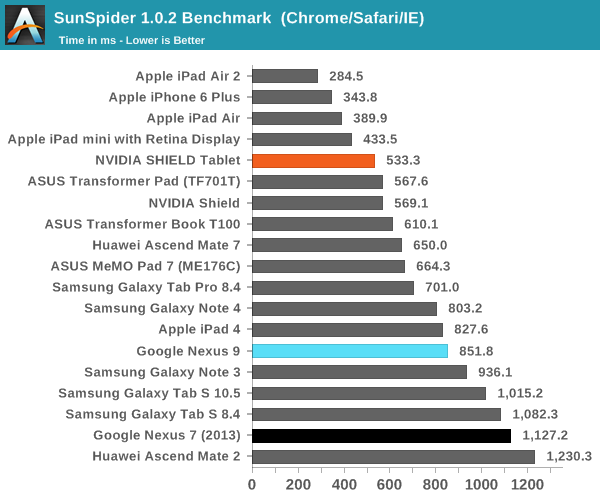
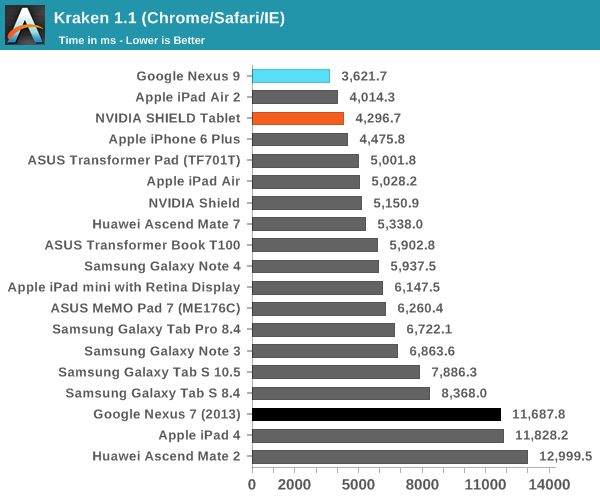
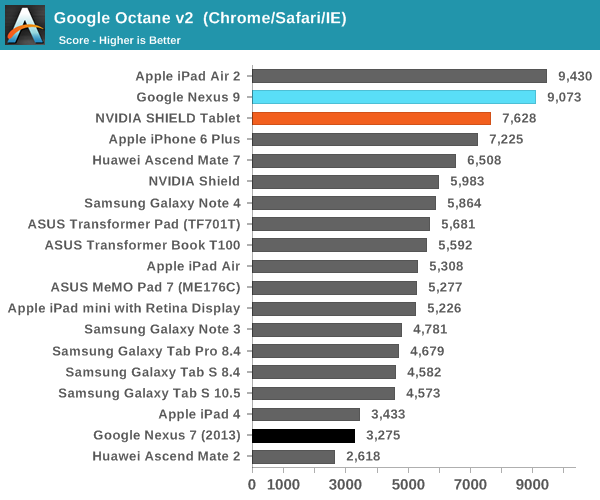
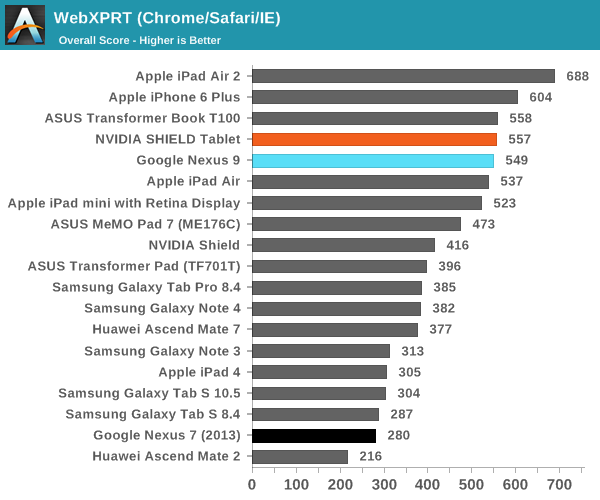
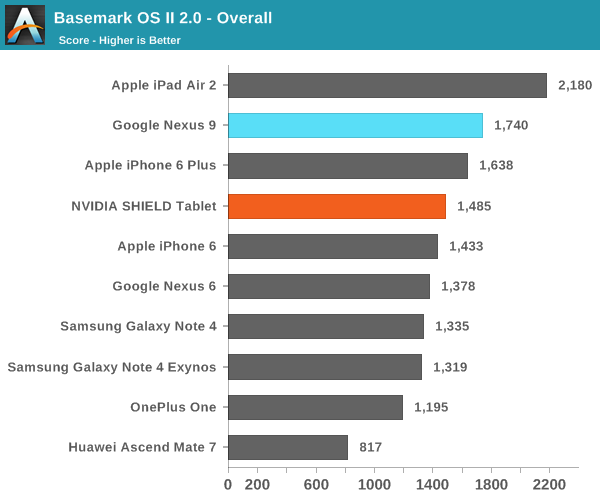
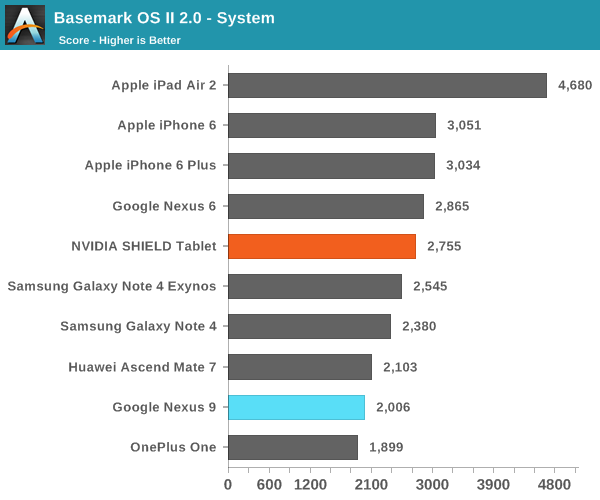
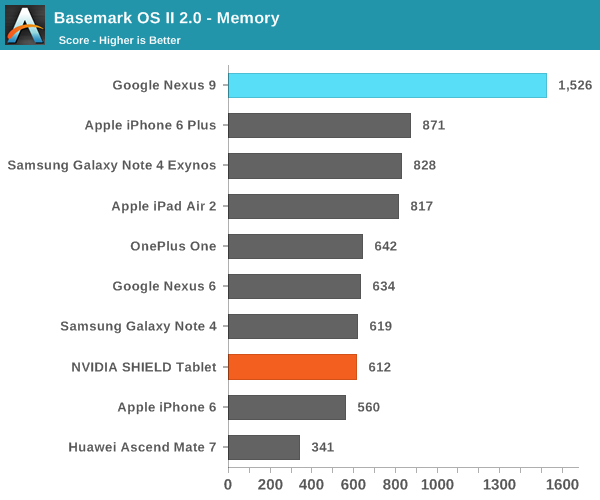
The Basemark System test seems to contribute quite strongly to how the Nexus 9 performs in the overall subtest. Given that this is a storage performance benchmark, it's likely that Basemark OS II has issues similar to Androbench on 5.0 Lollipop or that random I/O is heavily prioritized in this test.
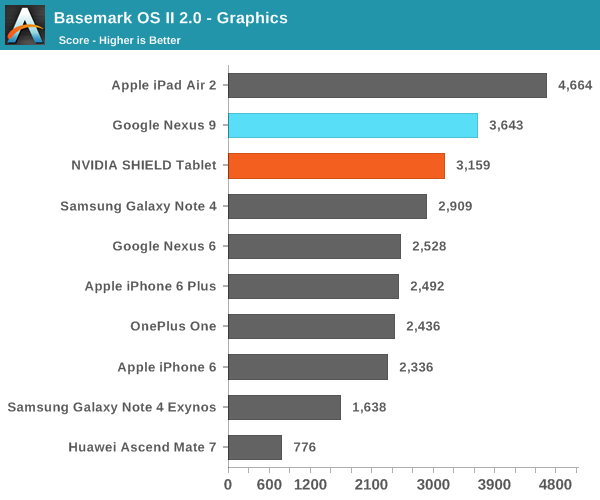
There's a noticeable performance uplift in the graphics test, and although not exactly part of the CPU this does seem at least somewhat plausible as GPU driver updates can improve performance over time.
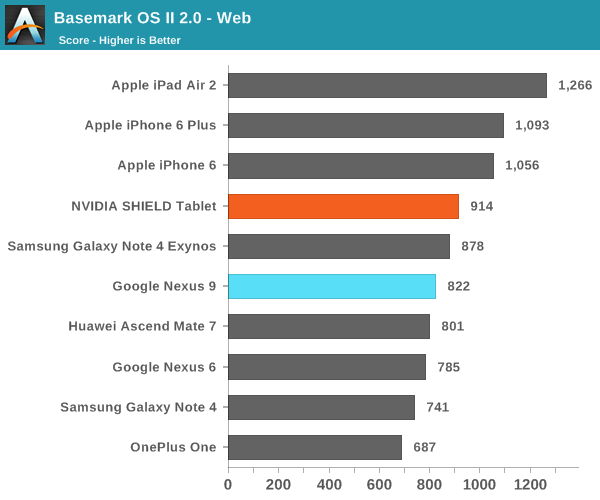
Overall, performance seems to be quite checkered, although improved from our initial evaluation of the Nexus 9. Unfortunately, even in benchmarks where the DCO should be able to easily unroll loops to achieve massive amounts of performance, we see inconsistent performance in Denver. This may come down to an issue with the DCO, or even more simply the fact that Denver is spending more time than it would like to directly executing ARM code as opposed to going through the DCO.
In this case looking at the SunSpider and Kraken javascript benchmarks offers an interesting proxy case for exactly that scenario. SunSpider on modern CPUs executes extremely quickly, so quickly that the individual tests are often over in only a couple of dozen of milliseconds. This is a particularly rough scenario for Denver, as it doesn’t provide Denver with much time to optimize, even if the code is run multiple times. Meanwhile Kraken pushes many similar buttons, but its tests are longer, and that gives Denver more time to optimize. Consequently we find that Denver’s SunSpider performance is quite poor – underperforming even the A15-based Tegra K1-32 – while Denver passes even the iPad Air 2 in Kraken.
Ultimately this kind of inconsistent performance is a risk and a challenge for Denver. While no single SoC tops every last CPU benchmark, we also don’t typically see the kind of large variations that are occurring with Denver. If Denver’s lows are too low, then it definitely impacts the suitability of the SoC for high-end devices, as users have come to expect peppy performance at all times.
In practice, I didn't really notice any issues with the Nexus 9's performance, although there were odd moments during intense multitasking where I experienced extended pauses/freezes that were likely due to the DCO getting stuck somewhere in execution, seeing as how the DCO can often have unexpected bugs such as repeated FP64 multiplication causing crashes. In general, I noticed that the device tended to also get hot even on relatively simple tasks, which doesn't bode well for battery life. This is localized to the top of the tablet, which should help with user comfort although this comes at the cost of worse sustained performance.










169 Comments
View All Comments
MonkeyPaw - Wednesday, February 4, 2015 - link
Maybe I missed it, but can you comment on browser performance in terms of tabs staying in memory? I had a Note 10.1 2014 for a brief time, and I found that tabs had to reload/refresh constantly, despite the 3GB of RAM. Has this gotten any better with the Nexus and Lollipop? Through research, I got the impression it was a design choice in Chrome, but I wondered if you could figure out any better. Say what you want about Windows RT, but my old Surface 2 did a good job of holding more tabs in RAM on IE.blzd - Friday, February 6, 2015 - link
Lollipop has memory management issues right now, as was mentioned in this very article. Apps are cleared from memory frequently after certain amount of up time and reboots are required.mukiex - Wednesday, February 4, 2015 - link
Hey Josh,Awesome review. As I'm sure others have noted, the Denver part alone was awesome to read about! =D
gixxer - Thursday, February 5, 2015 - link
There have been reports of a hardware refresh to address the buttons, light bleed, and flexing of the back cover. There was no mention of this in this article. What was the build date on the model that was used for this review? Is there any truth to the hardware refresh?Also, Lollipop is supposed to be getting a big update to 5.1 very soon. Will this article be updated with the new Lollipop build results? Will FDE have the option to be turned off in 5.1?
blzd - Friday, February 6, 2015 - link
Rumors. Unfounded rumors with zero evidence besides a Reddit post comparing an RMA device. All that proved was RMA worked as intended.The likelyhood of a hardware revision after 1 month on the market is basically 0%. The same goes for the N5 "revision" after 1 month which was widely reported and 100% proven to be false.
konondrum - Thursday, February 5, 2015 - link
My take from this article is that the Shield Tablet is probably the best value in the tablet market at the moment. I was really shocked to see the battery life go down significantly with Lollipop in your benchmarks, because in my experience battery life has been noticeably better than it was at launch.OrphanageExplosion - Thursday, February 5, 2015 - link
I seem to post this on every major mobile review you do, but can you please get it right with regards to 3DMark Physics? It's a pure CPU test (so maybe it should be in the CPU benches) and these custom dual-core efforts, whether it's Denver or Cyclone, always seem to perform poorly.There is a reason for that, and it's not about core count. Futuremark has even gone into depth in explaining it. In short, there's a particular type of CPU workload test where these architectures *don't* perform well - and it's worth exploring it because it could affect gaming applications.
http://www.futuremark.com/pressreleases/understand...
When I couldn't understand the results I was getting from my iPad Air, I mailed Futuremark for an explanation and I got one. Maybe you could do the same rather than just write off a poor result?
hlovatt - Thursday, February 5, 2015 - link
Really liked the Denver deep dive and we got a bonus in-depth tablet review. Thanks for a great article.behrangsa - Thursday, February 5, 2015 - link
Wow! Even iPad 4 is faster than K1? I remember nVidia displaying some benchmarks putting Tegra K1 far ahead of Apple's A8X.behrangsa - Thursday, February 5, 2015 - link
Anyway to edit comments? Looks like the K1 benchmark was against the predecessor to A8X, the A7.